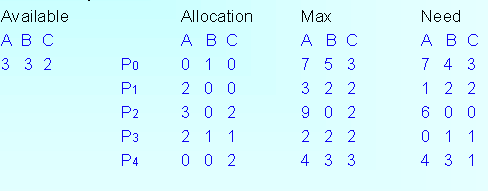/*......
Before moving to the algorithm...I am writing the structutre of the program
we have created two threads p and c
pthread_create(&c,NULL,&consume,NULL);
pthread_create(&p,NULL,&produce,NULL);
first argument is the address of the variable holding the address of the thread
second argument is priority of the thread which we have set to 0
third argument is the function name from where thread starts its execution
fourth argument is the parameter passed to the function...here we have no parameter hence we have written as NULL
NOW thread c will take handling consumer process and thread p will handle producer process
Consumer-Producer Problem
Here we have taken the bounded buffer of size 5
Three semaphores have been taken-:
mutex-Initial value is taken as 1,this has been used to implement lock ie. while producer is in
making changes to buffer consumer cannot do and vice-versa
empty-Initial value is size of the buffer since in the beginning buffer will be empty hence number of empty slots will also be equal to buffer
full-Initial value is 0 since at the beginning number of the filled slots are 0
...........*/
#include<stdio.h>
#include<pthread.h>
#include<semaphore.h>
pthread_t p;
pthread_t c;
sem_t mutex,full,empty;
int bufferSize=5;
int buffer[5];
int nextProduce,nextConsume;
int in,out;
void *produce(void *p)
{
int i=0;
while(i<=10)
{
sem_wait(&empty);//if buffer is full number of empty slots will be 0 hence empty=0 and thread has to wait here untill consumer consumes some of the product
sem_wait(&mutex);//it locks the consumer function so that while p is in its critical section c cannot move to its critical section
nextProduce=(int)rand();
buffer[in]=nextProduce;
printf("\nProduced %d at %d",nextProduce,in);
in=((in+1)%bufferSize);
sem_post(&mutex);//releasing the lock
sem_post(&full);//increasing the value of the full since number of filled slots will increase
i++;
}//end of while
}//end of produce
void *consume(void *p)
{int i=0;
while(i<=10)
{
sem_wait(&full);
sem_wait(&mutex);
nextConsume=buffer[out];
printf("\nConsume %d at %d",nextConsume,out);
out=((out+1)%bufferSize);
sem_post(&mutex);
sem_post(&empty);
i++;
}//end of while
}//end of consume
int main()
{
sem_init(&mutex,0,1);
sem_init(&full,0,0);
sem_init(&empty,0,bufferSize);
pthread_create(&c,NULL,&consume,NULL);
pthread_create(&p,NULL,&produce,NULL);
pthread_join(p,NULL);
pthread_join(c,NULL);
}
For compilation gcc -pthread xyz.c
Before moving to the algorithm...I am writing the structutre of the program
we have created two threads p and c
pthread_create(&c,NULL,&consume,NULL);
pthread_create(&p,NULL,&produce,NULL);
first argument is the address of the variable holding the address of the thread
second argument is priority of the thread which we have set to 0
third argument is the function name from where thread starts its execution
fourth argument is the parameter passed to the function...here we have no parameter hence we have written as NULL
NOW thread c will take handling consumer process and thread p will handle producer process
Consumer-Producer Problem
Here we have taken the bounded buffer of size 5
Three semaphores have been taken-:
mutex-Initial value is taken as 1,this has been used to implement lock ie. while producer is in
making changes to buffer consumer cannot do and vice-versa
empty-Initial value is size of the buffer since in the beginning buffer will be empty hence number of empty slots will also be equal to buffer
full-Initial value is 0 since at the beginning number of the filled slots are 0
...........*/
#include<stdio.h>
#include<pthread.h>
#include<semaphore.h>
pthread_t p;
pthread_t c;
sem_t mutex,full,empty;
int bufferSize=5;
int buffer[5];
int nextProduce,nextConsume;
int in,out;
void *produce(void *p)
{
int i=0;
while(i<=10)
{
sem_wait(&empty);//if buffer is full number of empty slots will be 0 hence empty=0 and thread has to wait here untill consumer consumes some of the product
sem_wait(&mutex);//it locks the consumer function so that while p is in its critical section c cannot move to its critical section
nextProduce=(int)rand();
buffer[in]=nextProduce;
printf("\nProduced %d at %d",nextProduce,in);
in=((in+1)%bufferSize);
sem_post(&mutex);//releasing the lock
sem_post(&full);//increasing the value of the full since number of filled slots will increase
i++;
}//end of while
}//end of produce
void *consume(void *p)
{int i=0;
while(i<=10)
{
sem_wait(&full);
sem_wait(&mutex);
nextConsume=buffer[out];
printf("\nConsume %d at %d",nextConsume,out);
out=((out+1)%bufferSize);
sem_post(&mutex);
sem_post(&empty);
i++;
}//end of while
}//end of consume
int main()
{
sem_init(&mutex,0,1);
sem_init(&full,0,0);
sem_init(&empty,0,bufferSize);
pthread_create(&c,NULL,&consume,NULL);
pthread_create(&p,NULL,&produce,NULL);
pthread_join(p,NULL);
pthread_join(c,NULL);
}
For compilation gcc -pthread xyz.c
